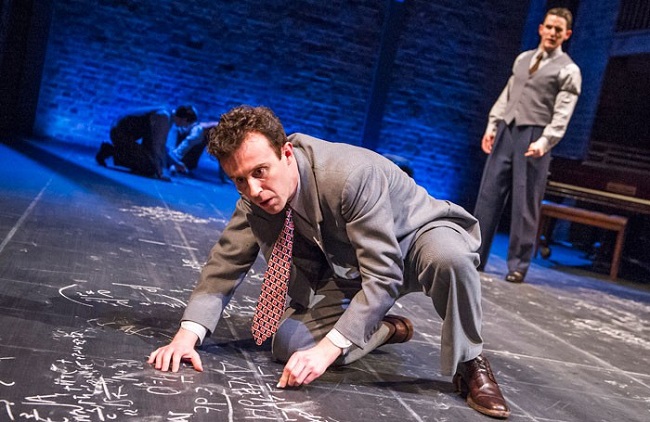
It’s a popular time to make like it’s the Forties. A bar just opened in Carnaby dressed as a Tube station in the Blitz, and the wartime code breaking centre Bletchley Park has revealed a surge in visitors since the release of The Imitation Game, the Benedict Cumberbatch movie documenting the life of Enigma code breaker Alan Turing.
Next in line is Oppenheimer, an RSC production already awarded five star reviews for its run in Stratford. It’s a slow walk through (at nearly three hours) of the US physicist J Robert Oppenheimer’s spearheading role in the creation of the atomic bomb that landed on Hiroshima in 1945. The play paints Oppenheimer, played with finesse by John Heffernan, as an icy and affirmative leader, a politician of sorts, managing the relationships between scientists and the US military during the war. Who’d have thought physicists and war leaders could clash over dress codes…
The play deals slowly and carefully with the sums behind atomic warfare whilst conveying the practices of wartime living. Oppenheimer has two women on the go, and boozy leftist parties highlight the tensions of the time whilst musical numbers and dance sequences offset the verbose subject of winning a war. It’s a rather macabre topic to sing-a-long to, and the choreographed musical bits never fully lift off.
The Forties are staged with extraordinary virtuosity with everything from a straightforward academic chalkboard to complex, engaging visuals and towering set pieces. At its most visually arresting we see two atomic bombs including Hiroshima’s Little Boy, yet the first looked more like Willy Wonka’s Everlasting Gobstopper than a lean machine of death – but who’s telling. There’s certainly a lot to look at and this play makes good use of a simple, well-crafted set design.
Angus Jackson’s direction is compelling as we pivot between Oppenheimer’s lecture theatre in Berkeley (when the house lights go up and physicists walk through the audience) and being members of the audience at the Vaudeville again. I only wish Tom Morton-Smith’s script made better use of its multitude of characters, who are often wafer-thin depictions used only to forefront differences of opinion at war. The production’s photos depict a love story – though Oppenheimer’s actions never hint at a long-standing interest in either of the play’s women and the narrative, though well-paced, wasn’t always exhilarating enough for its subject.
Yet, a clear picture of Oppenheimer’s place in history is painted. His passion, and menace, as leader of the gang and as cold-hearted strategist (like Turing) is fully palpable come the play’s end when he calls the birth of nuclear warfare ‘a loaded gun in a playground’. Seventy years on, could Morton-Smith be pondering on a mid-life crisis for nuclear weaponry?
Thanks to our friends at www.OfficialTheatre.com for these tickets



